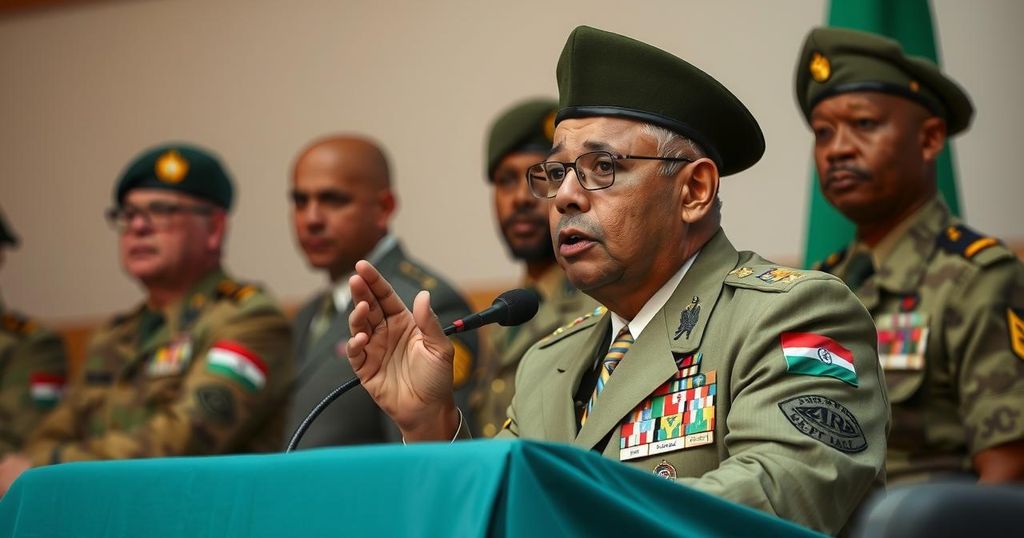Libyan Prime Minister Opposes Russian Military Reinforcement Efforts in Libya

Libyan Prime Minister Abdul Hamid Dabaiba has rejected Russia’s military reinforcements in eastern Libya, citing fears of escalating conflict in the region. His government aims to prevent Libya from becoming a site for foreign power struggles. Amidst increasing U.S. economic pressure, the situation remains tense, with reports indicating significant Russian military support for eastern factions, which may complicate internal crises further.
Libyan Prime Minister Abdul Hamid Dabaiba has expressed firm opposition to Russia’s efforts to escalate its military presence in eastern Libya following the recent developments in Syria. Dabaiba vociferously rejected the notion of transforming Libya into a battleground for international disputes, emphasizing that it should not serve as a battleground for international conflicts. He raised alarms regarding the potential consequences of foreign military presence on Libya’s fragile stability.
The North African nation has been enduring a prolonged struggle since the NATO-backed overthrow of dictator Muammar Gaddafi in 2011, resulting in a split between the Tripoli-based government recognized by the United Nations and a rival faction bolstered by military leader Khalifa Haftar. Recent reports reveal that Russian military assets from Syria have been redirected to bolster this Eastern faction, raising concerns about the implications for Libya’s internal conflict.
Dabaiba contended that fostering foreign arms transfers into Libya would exacerbate the existing crises further, asserting that “no one with an ounce of patriotism wants a foreign power to impose its hegemony and authority.” He indicated that he had reached out to the Russian ambassador to seek clarification on these developments.
Furthermore, Jalel Harchaoui from the Royal United Services Institute interpreted Dabaiba’s denunciation as a critical moment, suggesting it may have been a strategic move to align with U.S. interests amidst increasing economic pressures on Libyan leadership. The U.S. has initiated significant economic sanctions concerning corruption, further complicating the political landscape.
The Libyan Central Bank informed that it would be suspended from conducting dollar transactions until a reputable auditor is appointed to oversee operations, following unearthed discrepancies related to oil revenues. Harchaoui highlighted that new audits are likely to expose evidence linking oil smuggling and illicit financial relations with Russia, thus paving the way for potential sanctions on involved parties.
In light of these dynamics, the geopolitical environment in Syria has also shifted, with increased hostility and uncertainty surrounding Russian operations, necessitating a reevaluation of Moscow’s strategic assets and alliances in the region. The ongoing influx of Russian military personnel and equipment underscores the gravity of the situation, potentially altering the existing balance of power in Libya.
The backdrop of this article centers on the political turmoil that has engulfed Libya since the ousting of long-time dictator Muammar Gaddafi in 2011. Since then, the country has been fragmented between an internationally recognized government in Tripoli and a rival administration in the east led by Khalifa Haftar. Amid this unrest, Russia has sought to strengthen its influence in the region by bolstering its military presence, particularly aligning with eastern forces. This recent push has been met with vehement opposition from Libyan Prime Minister Abdul Hamid Dabaiba, who aims to protect Libya from becoming an arena for great-power rivalries and international conflicts.
In conclusion, the attempts by Russia to reinforce its military foothold in eastern Libya have met decisive resistance from Prime Minister Abdul Hamid Dabaiba, who prioritizes national sovereignty and stability. The complex geopolitical landscape, further exacerbated by U.S. economic interventions and the intricacies of Libyan internal divisions, highlights the delicate position Libya occupies in the broader context of international affairs. Dabaiba’s reactions reflect an urgent need to assert independence while navigating the pressures of external influences.
Original Source: www.theguardian.com






